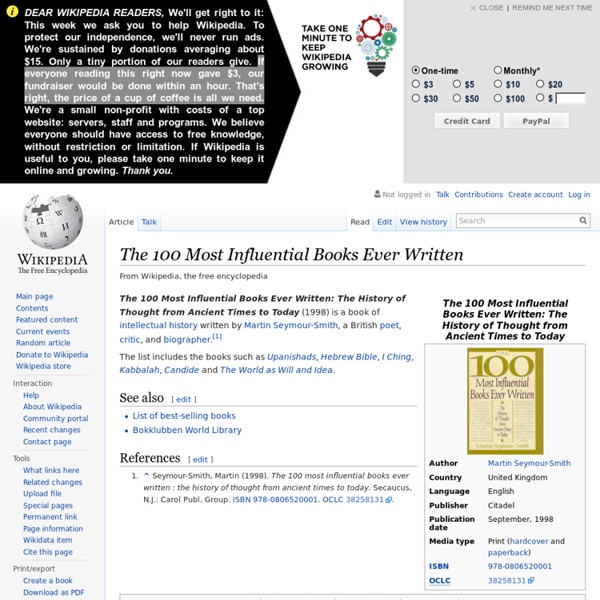The 100 Most Influential Books Ever Written (book)
The 100 Most Influential Books Ever Written: The History of Thought from Ancient Times to Today (1998) is a book of intellectual history written by Martin Seymour-Smith, a British poet, critic, and biographer.[1] The list includes the books such as Upanishads, Hebrew Bible, I Ching, Kabbalah, Candide and The World as Will and Idea. See also[edit] References[edit] Jump up ^ Seymour-Smith, Martin (1998). The 100 most influential books ever written : the history of thought from ancient times to today.
https://en.wikipedia.org/wiki/The_100_Most_Influential_Books_Ever_Written
Making Life Delicious
Jelly Bean Bark Looking for something super easy and delicious to make […] Easy Cinnamon Rolls Years ago, it was The Pioneer Woman who inspired me to […] Tradition, Birthdays & the First Day of Spring
The Online Books Page
Listing over 3 million free books on the Web - Updated Thursday, May 13, 2021 Search our Listings -- New Listings -- Authors -- Titles -- Subjects -- Serials We reach Public Domain Day, and 3 million titles -- Blog (Everybody's Libraries) -- Latest Book Listings A Celebration of Women Writers -- Banned Books Online -- Prize Winners Online General -- Non-English Language -- Specialty About Us -- FAQ -- Get Involved!
Keffiyeh
Iraqi man photographed in 2003 wearing keffiyeh. The keffiyeh or kufiya (Arabic: كوفية kūfiyyah, meaning "from the city of Kufa" (الكوفه); plural كوفيات kūfiyyāt), also known as a ghutrah (غُترَة), shemagh (شماغ), ḥaṭṭah (حَطّة), mashadah (مَشَدة), chafiye (Persian: چَفیِه) or cemedanî (Kurdish: جه مه داني), is a traditional Middle Eastern headdress fashioned from a square scarf, usually made of cotton. It is typically worn by Arabs and also some Kurds.
Recipes @ Whole Foods Market
Welcome back {* welcomeName *}! {* loginWidget *} {* #userInformationForm *} {* traditionalSignIn_emailAddress *} {* traditionalSignIn_password *} {* traditionalSignIn_signInButton *}
Hipster: The Dead End of Western Civilization
Update Required To play the media you will need to either update your browser to a recent version or update your Flash plugin. Audio version read by George Atherton – Right-click to download I’m sipping a scummy pint of cloudy beer in the back of a trendy dive bar turned nightclub in the heart of the city’s heroin district. In front of me stand a gang of hippiesh grunge-punk types, who crowd around each other and collectively scoff at the smoking laws by sneaking puffs of “fuck-you,” reveling in their perceived rebellion as the haggard, staggering staff look on without the slightest concern.
design blog - DesignAddict: Save food from the refrigerator
posted on November 26 by DesignAddict. Jihyun Ryou, Design Academy Eindhoven graduate, did his Master Thesis about food preservation. By accumulating traditional oral knowledge, he looked at a feasible way to bring the knowledge into everyday life.
How the Other Half Dies
In the book, George examines and disputes two popular ideas: first, that there is not enough food, and second, that the world is over-populated. She argues that the planet could easily feed its present population and many more. She also insists that the problem is not climate change and that food technology will not provide the solution. George instead believes that the problem is that world food supply is controlled by the wealthy elite and that the poor have no say on the terms of trade that keep them hungry.[1]
Squirrel Jerky Recipe
Thats right, Squirrel Jerky , this isn’t your average Beef Jerky! No more store bought brands of Beef Jerky sealed in their little plastic bags. Jerky was originally a survival food, not a snack for low carb losers looking to stuff their face while driving to the next fast food restaurant in their Prius. Jerky, or dried meat, was a preservation method used to stretch out food supplies into those leaner months when food was scarce. And it wasn’t always made out of Beef, any available meat could be dried and cured into jerky, hence the term jerked meat.
Related:
Related:



